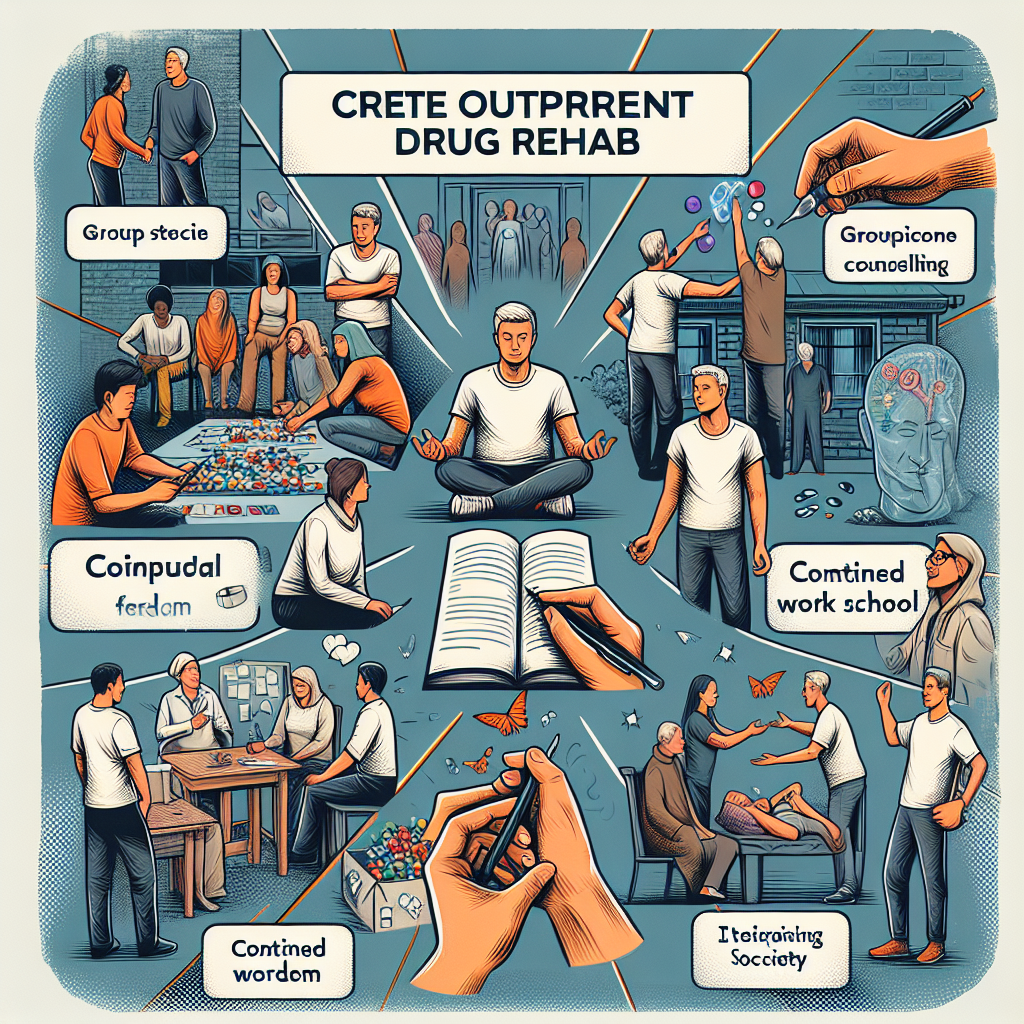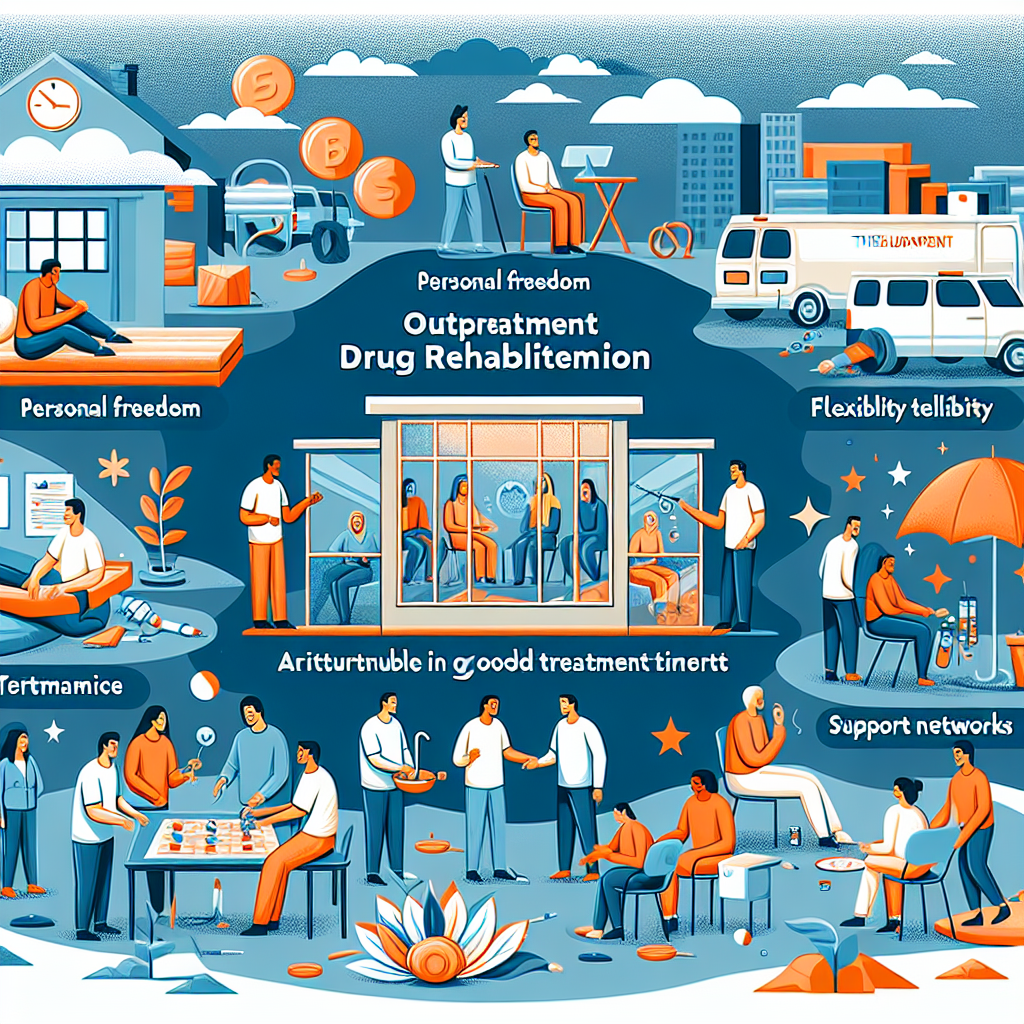-
Table of Contents

“Outpatient Drug Rehab: Flexibility, Affordability, and Real-World Recovery.”
Introduction
Outpatient drug rehab offers several advantages for individuals seeking treatment for substance abuse. One of the primary benefits is the flexibility it provides, allowing patients to maintain their daily responsibilities such as work, school, and family commitments while receiving treatment. This type of rehab is typically more affordable than inpatient programs, making it accessible to a broader range of people. Outpatient rehab also enables individuals to apply coping strategies and skills learned during therapy in real-world settings immediately, which can enhance the recovery process. Additionally, it provides a support network through group therapy and counseling sessions, fostering a sense of community and shared experience among participants. Overall, outpatient drug rehab can be an effective and practical option for those looking to overcome addiction while maintaining their everyday lives.
Cost-Effectiveness: The Financial Benefits of Outpatient Drug Rehab
Outpatient drug rehab programs offer a multitude of benefits, one of the most significant being their cost-effectiveness. For many individuals and families grappling with the financial strain of addiction treatment, outpatient rehab presents a viable and affordable alternative to inpatient care. This financial accessibility can be a crucial factor in the decision-making process, allowing more people to seek the help they need without the burden of exorbitant costs.
To begin with, outpatient drug rehab programs typically require fewer resources than their inpatient counterparts. Inpatient facilities must provide round-the-clock care, including meals, lodging, and constant medical supervision. These comprehensive services, while necessary for some, come with a high price tag. In contrast, outpatient programs allow individuals to live at home and attend treatment sessions at scheduled times. This structure significantly reduces overhead costs, which in turn lowers the overall expense for participants.
Moreover, outpatient rehab enables individuals to maintain their employment while undergoing treatment. The ability to continue working not only provides a sense of normalcy and purpose but also ensures a steady income. This financial stability can alleviate the stress associated with taking time off work and losing wages, which is often a concern with inpatient programs. By allowing individuals to balance their professional responsibilities with their recovery journey, outpatient rehab fosters a more sustainable and less disruptive approach to treatment.
In addition to employment, outpatient programs offer the flexibility to manage other personal responsibilities, such as childcare and household duties. This flexibility can be particularly beneficial for single parents or primary caregivers who might otherwise struggle to find suitable arrangements during an extended inpatient stay. By accommodating these responsibilities, outpatient rehab reduces the need for additional expenses related to childcare or household help, further enhancing its cost-effectiveness.
Another financial advantage of outpatient drug rehab is the potential for insurance coverage. Many insurance plans are more likely to cover outpatient treatment due to its lower cost compared to inpatient care. This increased likelihood of coverage can significantly reduce out-of-pocket expenses for individuals and families. Additionally, some outpatient programs offer sliding scale fees based on income, making treatment even more accessible to those with limited financial resources.
Furthermore, the community-based nature of outpatient rehab can lead to long-term financial benefits. By integrating treatment into daily life, individuals learn to navigate real-world challenges and develop coping strategies in their natural environment. This practical approach can lead to more sustainable recovery outcomes, reducing the likelihood of relapse and the need for repeated treatment. In the long run, this can result in substantial savings, both financially and emotionally.
It is also worth noting that the cost-effectiveness of outpatient drug rehab does not come at the expense of quality care. Many outpatient programs offer comprehensive services, including individual and group therapy, medical support, and holistic treatments such as yoga and meditation. These programs are designed to address the multifaceted nature of addiction, providing a well-rounded approach to recovery that can be just as effective as inpatient care for many individuals.
In conclusion, the financial benefits of outpatient drug rehab are manifold. By offering a more affordable alternative to inpatient treatment, allowing individuals to maintain employment and personal responsibilities, and increasing the likelihood of insurance coverage, outpatient programs make recovery accessible to a broader population. This cost-effectiveness, combined with the potential for long-term success, underscores the value of outpatient rehab as a viable and inspiring option for those seeking to overcome addiction.
Flexibility and Freedom: How Outpatient Drug Rehab Fits Into Your Life
Outpatient drug rehab offers a unique blend of flexibility and freedom that can seamlessly integrate into your daily life, making it an appealing option for many individuals seeking recovery. Unlike inpatient programs, which require a residential stay, outpatient rehab allows you to maintain your daily responsibilities while receiving the support and treatment you need. This balance can be particularly beneficial for those who have work, school, or family obligations that cannot be put on hold.
One of the most significant advantages of outpatient drug rehab is its ability to provide a structured treatment plan without the need for a complete lifestyle overhaul. This means you can continue to live at home, surrounded by your support network of family and friends, which can be incredibly motivating and comforting during the recovery process. The ability to stay connected with loved ones can foster a sense of normalcy and stability, which is often crucial for long-term success.
Moreover, outpatient programs are designed to be flexible, accommodating various schedules and commitments. This flexibility allows you to attend therapy sessions, group meetings, and other treatment activities at times that are convenient for you. Whether you have a full-time job, are pursuing an education, or have other personal responsibilities, outpatient rehab can be tailored to fit your unique situation. This adaptability ensures that you can receive the necessary care without sacrificing other important aspects of your life.
In addition to flexibility, outpatient drug rehab offers a level of freedom that can be empowering for individuals in recovery. The ability to manage your own time and make decisions about your daily routine can instill a sense of autonomy and control, which is often lost during addiction. This empowerment can be a critical component of the recovery journey, as it encourages personal responsibility and self-efficacy. By actively participating in your treatment plan and making choices that support your sobriety, you can build confidence and resilience.
Furthermore, outpatient rehab provides access to a wide range of therapeutic modalities and support services. From individual counseling and group therapy to holistic approaches like yoga and meditation, these programs offer comprehensive care that addresses the physical, emotional, and psychological aspects of addiction. The diverse array of treatment options ensures that you can find the methods that resonate most with you, enhancing the overall effectiveness of the program.
Another notable benefit of outpatient drug rehab is the opportunity to apply what you learn in real-time. As you navigate your daily life, you can immediately implement coping strategies, communication skills, and other tools acquired during therapy sessions. This practical application reinforces learning and helps you develop healthy habits and behaviors that can sustain your recovery long-term. Additionally, encountering real-world challenges while still in treatment allows you to receive immediate support and guidance from your therapists and peers, fostering a proactive approach to overcoming obstacles.
Lastly, outpatient rehab can be more cost-effective than inpatient programs, making it a viable option for those with financial constraints. The reduced cost does not compromise the quality of care, as outpatient programs are staffed by experienced professionals dedicated to helping you achieve lasting recovery. This affordability ensures that more individuals have access to the support they need to overcome addiction.
In conclusion, outpatient drug rehab offers a harmonious blend of flexibility and freedom that can seamlessly fit into your life. By allowing you to maintain your daily responsibilities, stay connected with your support network, and apply therapeutic techniques in real-time, outpatient rehab provides a comprehensive and empowering path to recovery. With its adaptable schedule, diverse treatment options, and cost-effectiveness, outpatient drug rehab stands as a compelling choice for those seeking to reclaim their lives from addiction.
Q&A
1. **Flexibility and Convenience**: Outpatient drug rehab allows individuals to maintain their daily responsibilities, such as work, school, or family commitments, while receiving treatment.
2. **Cost-Effectiveness**: Outpatient programs are generally less expensive than inpatient rehab because they do not require the costs associated with housing and 24/7 care.
Conclusion
Outpatient drug rehab offers several advantages, including greater flexibility, allowing individuals to maintain work, school, and family responsibilities while receiving treatment. It is generally more cost-effective than inpatient programs and provides access to a support network in the patient’s own community. Additionally, outpatient rehab can offer a continuum of care, enabling individuals to transition smoothly from intensive treatment to less intensive support as they progress in their recovery. This approach can also help patients apply coping strategies in real-world settings, potentially leading to more sustainable long-term recovery outcomes.



